Search Posts
Recent Posts
- Christopher Buonanno running for Cranston City Council, city-wide April 27, 2024
- Rhode Island Weather for April 27, 2024 – John Donnelly April 27, 2024
- Eat, Play, Learn: Summer opportunities fair for Providence – TODAY April 27, 2024
- Caitlyn Clark and breaking the glass ceiling for women in all sports – John Cardullo April 27, 2024
- In the news… your quick look at the week ending April 27th April 27, 2024
Categories
Subscribe!
Thanks for subscribing! Please check your email for further instructions.
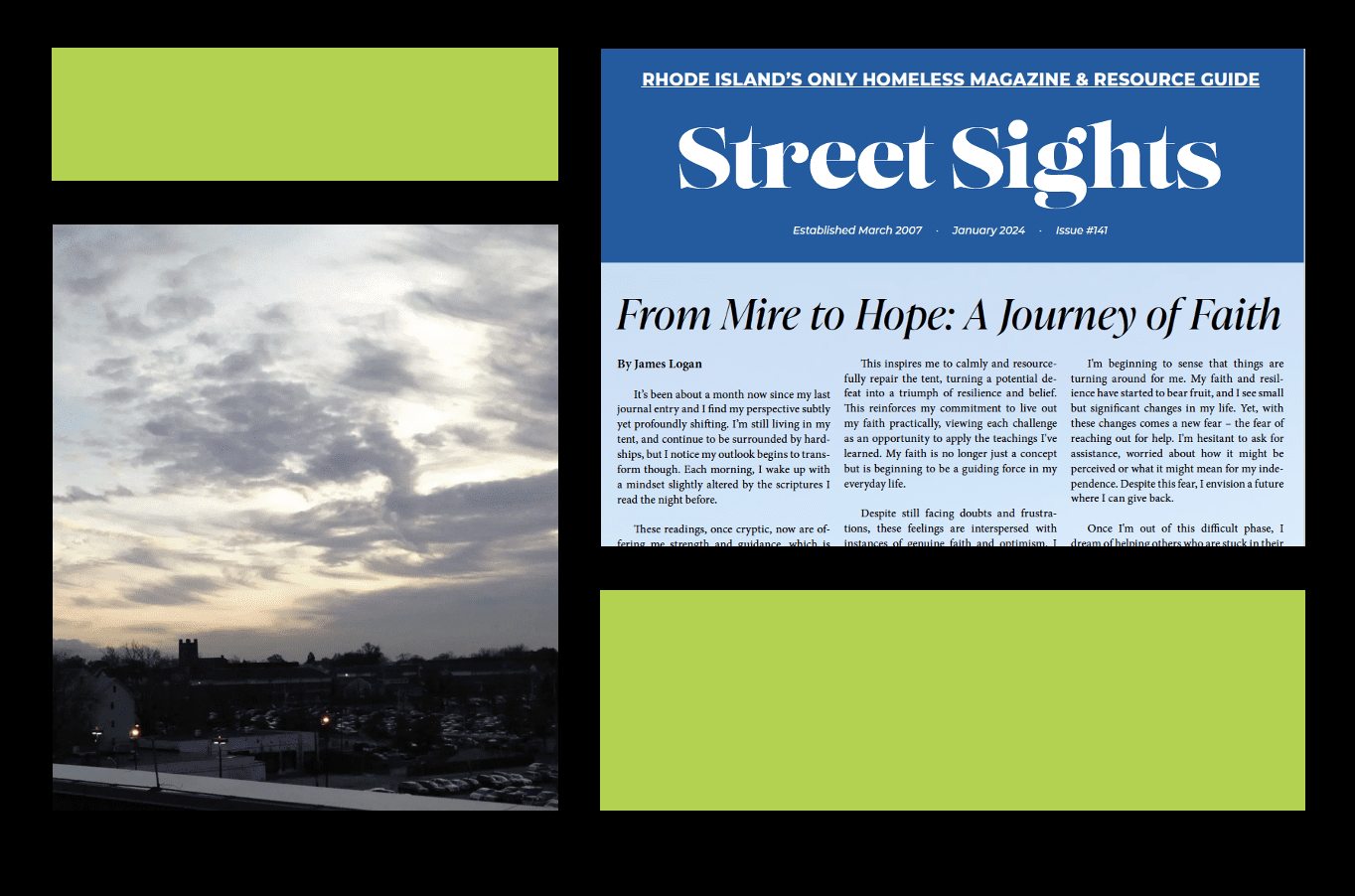
Homeless in RI: Updates. Hope from inside a tent. New HUD funding. ’23 accomplishments.
We continue our series of articles reporting on various issues and developments on homelessness in Rhode Island.
Street Sights – RI’s homeless magazine and resource guide

Janice Luongo produces a regular, monthly publication targeted to the homeless population in Rhode Island. The opening story, here, by James Logan, is written by a man who is living, as you read this, in a tent. His article, “From Mire to Hope”, a Journey of Faith will touch you and your perspective on the depths one can find one’s self in.
A mix of purposeful information, issues discussion and advocacy, sharing the writing of others and even a poetry section where individuals experiencing homelessness can submit their work. It is as much cultural as it is a resource book, reflecting the need for immediate information as well as reaching deeper into the soul and spirit of the person who will hold this in their hands. The January issue is #141.
The front story is by James Logan – “From Mire to Hope…” which Logan wrote to Street Sights from his tent. To read, scroll down using bar at right, under the two symbols “>>” or click on the “Download” button.
___
Families whose lack of housing puts their children at risk of foster care placement
HUD will join Governor McKee, Senator Reed, Congressman Magaziner, Congressman Amo, RI Housing, and partners TODAY, Monday, January 8, at 11:00 a.m. at RI Housing for an announcement about funding for addressing youth and family homelessness in the state – whose lack of housing is the primary reason their children are in foster care.
Participating are: RI Gov. Dan McKee – Senator Jack Reed – Representative Seth Magaziner – Representative Gabe Amo – Peter Asen, Director, HUD Rhode Island Field Office – Stefan Pryor, Secretary, RI Department of Housing – Carol Ventura, Chief Executive Officer, RI Housing – Ashley Deckert, Director, RI Department of Children, Youth & Families.
This announcement is expected to be part of the new HUD program providing $10 million to 13 public housing authorities nationwide, that will be used to identify youth with a history of foster care involvement who are homeless or at risk of homelessness and families whose lack of adequate housing is the primary reason their children are in foster care.
HUD’s Family Unification Program will provide 625 Family Unification Program vouchers to youth and families to find housing and will help strengthen coordination among public housing authorities, public child welfare agencies, and Continuums of Care and increase access to supportive services for those who need them.
In a national press release in December, HUD Secretary Marcia L. Fudge said, “Keeping youth and families off the streets is essential to our efforts to reduce and ultimately end homelessness. This funding will help our local partners aid youth and allow families to get into more permanent and stable housing. HUD is committed to ending homelessness, and this funding and partnership help us continue that critical part of our mission.”
Two groups are targeted for this funding assistance:
- Families for whom the lack of adequate housing is a primary factor in the imminent placement of the family’s child, or children, in out-of-home care; or the delay in the discharge of the child, or children, to the family from out-of-home care; and
- Youth aged 18 to 24, who have either exited foster care or will do so within the next 90 days, and meet the criteria outlined in Section 475(5)(H) of the Social Security Act, are eligible if they are homeless or at risk of homelessness and are 16 years or older.
There is no time limit on vouchers issued to families. Vouchers issued to youth are limited to 36 months unless the youth meets the requirements to receive an extension of up to 24 month. Youth must receive supportive services for 36 months. Examples of the skills targeted by these services include money management, job preparation, educational counseling, and proper nutrition and meal preparation.
On a chart listing the 13 programs to receive funding, there is $354,369 for the Rhode Island Housing and Mortgage Finance Corporation.
___
Woonsocket’s Dignity Bus
After some fits and starts getting the bus situation operational with proper utility hookups, inspections and licenses, and the constant struggle with programs serving the homeless to find staff, the bus is in business. Tony Zorbough from “The Source” in Florida, providers of the bus to over 4 or 5 cities in the US now, posted photos of the successful opening after a trip up for the opening:
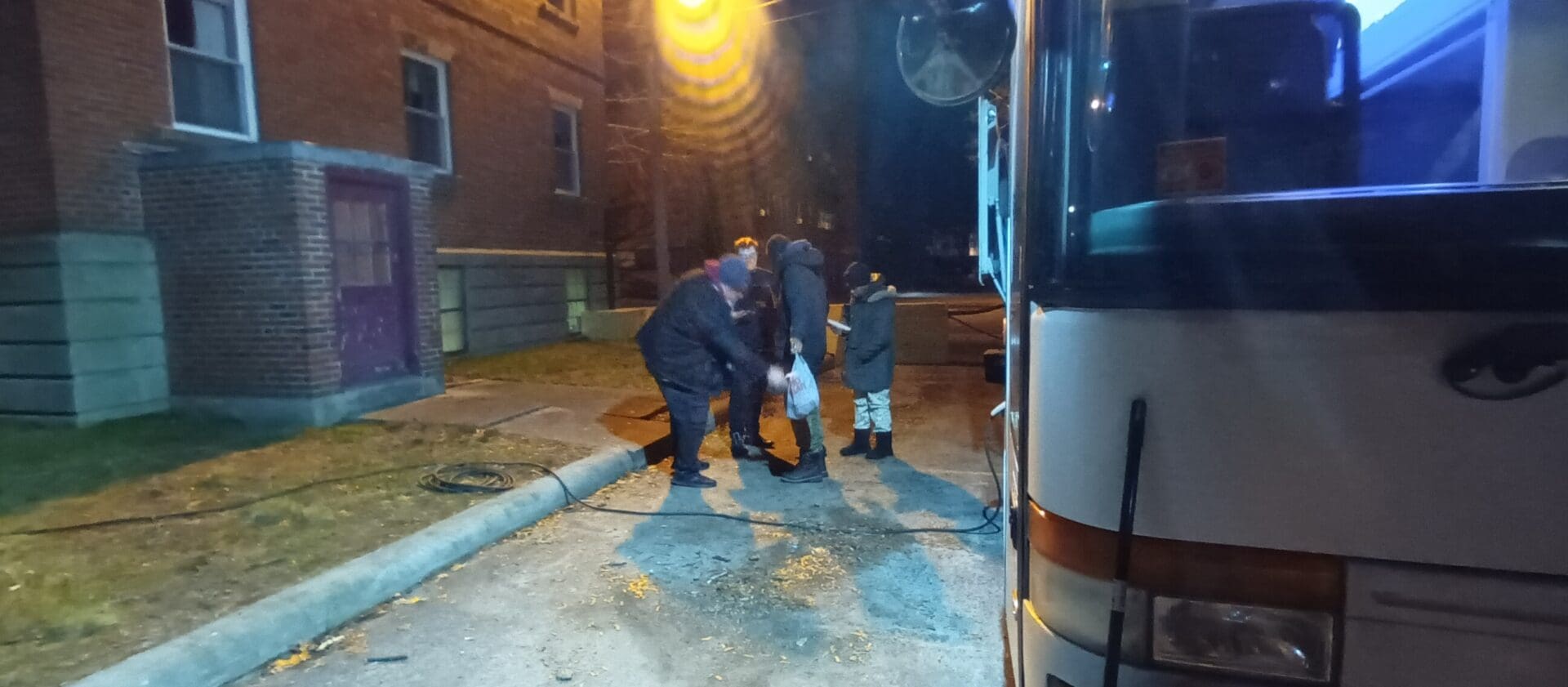
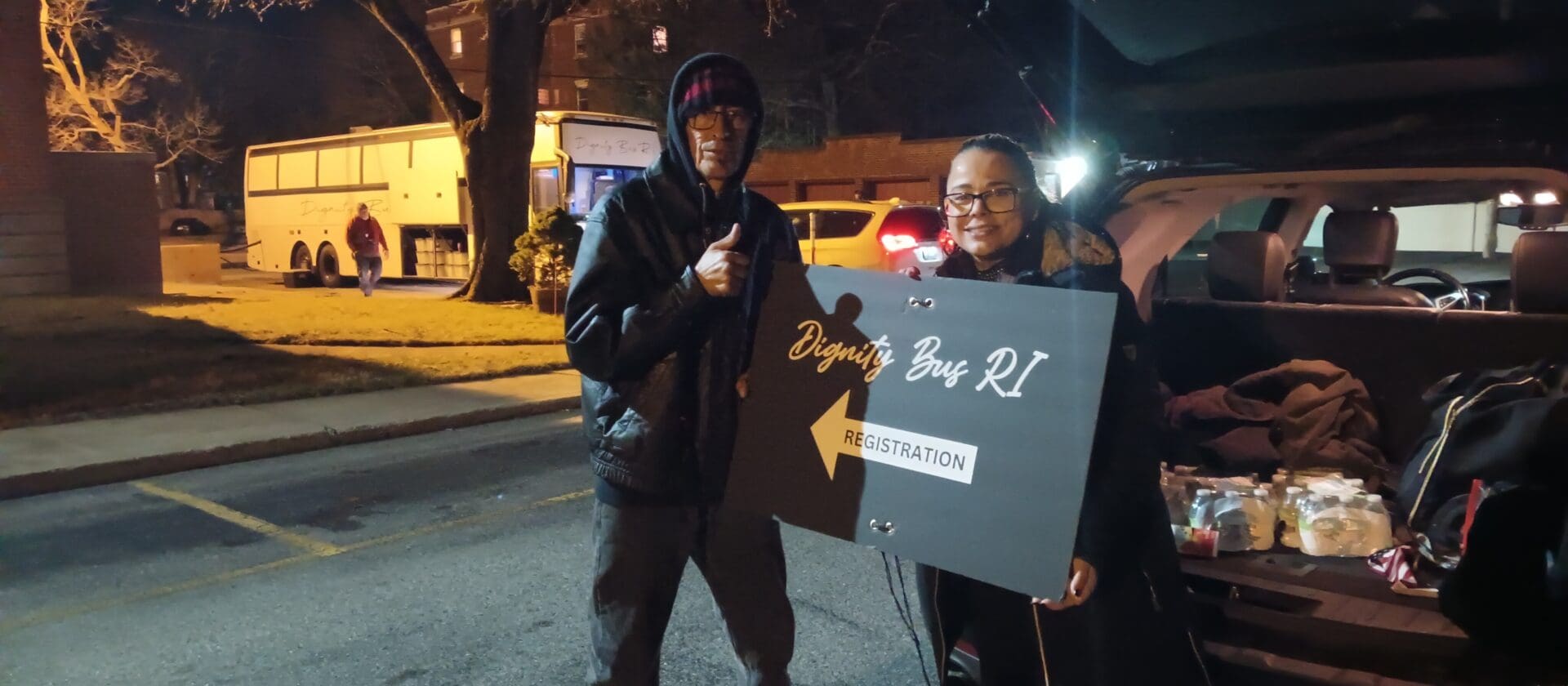
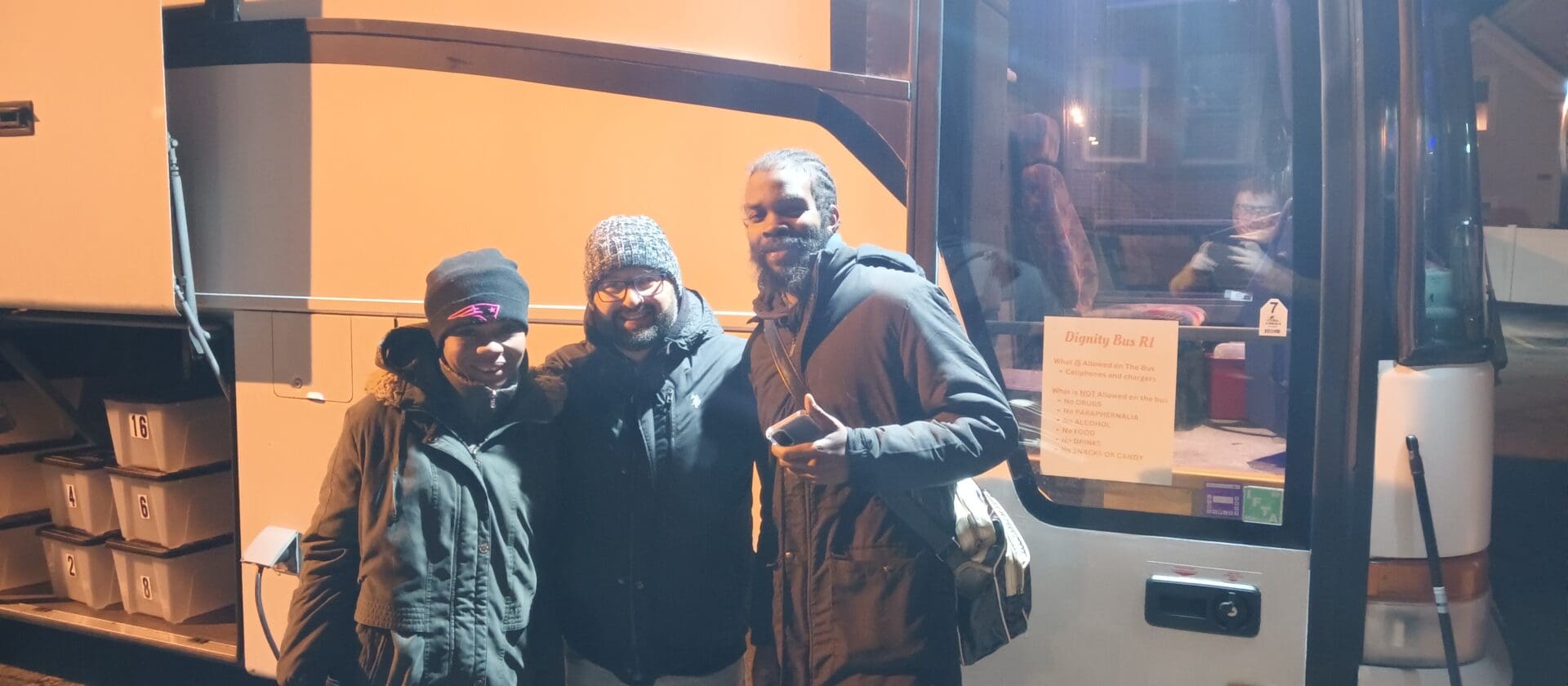
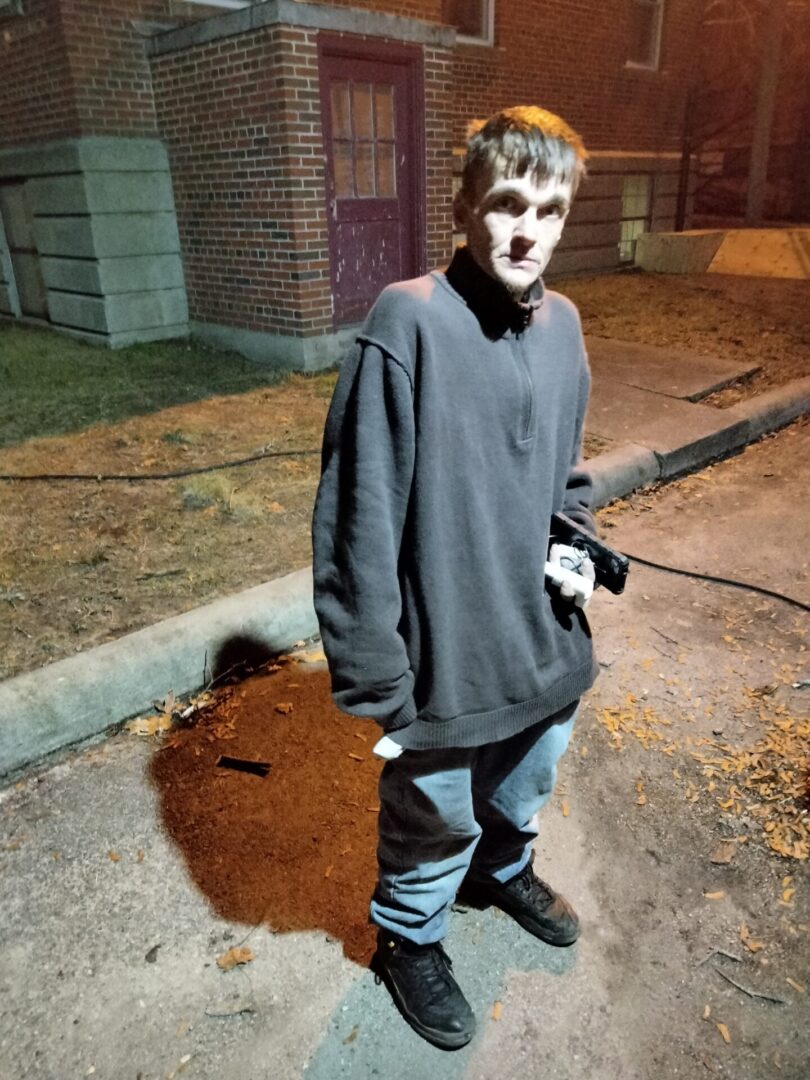
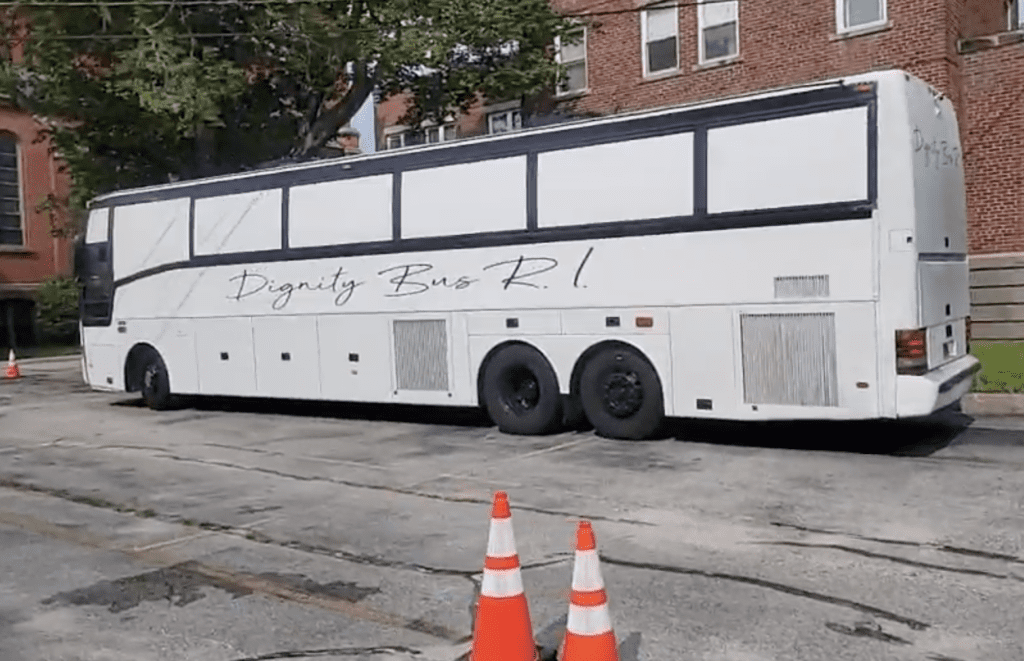
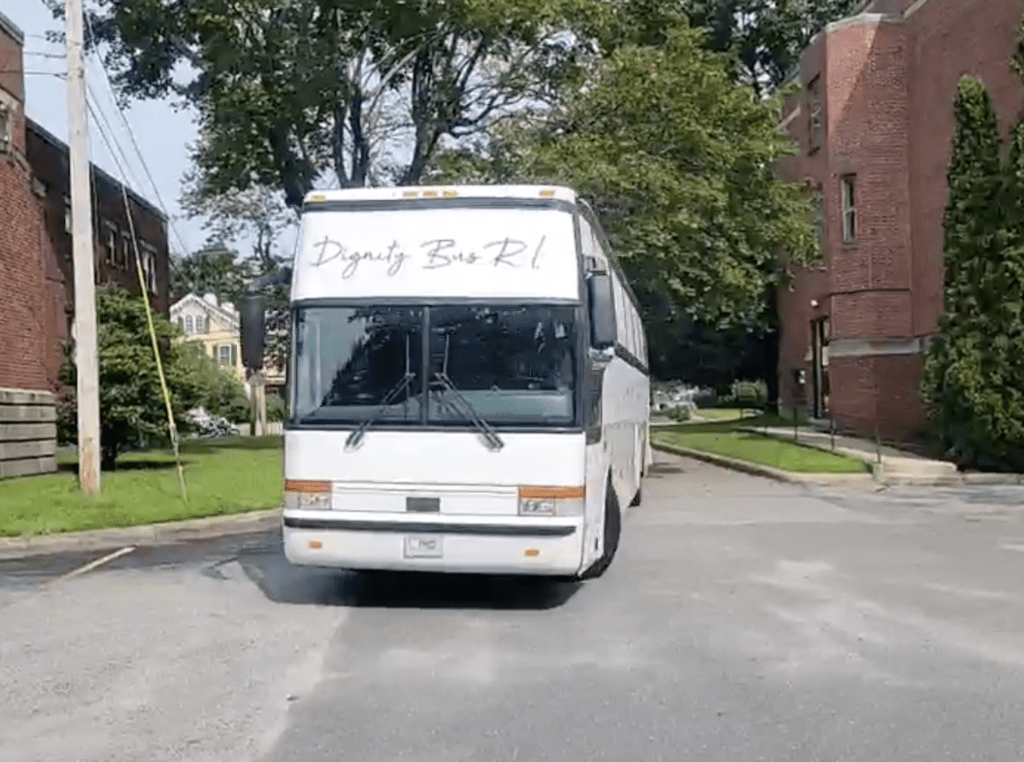
More updates coming soon…
___
Woonsocket Shelter
Community Care Alliance, and the Vida Church have entered into an arrangement to provide a warming facility & shelter for weather events impacting the unhoused in Woonsocket. The cost to provide these services will be underwritten by the Rhode Island Department of Housing, primarily via the Municipal Homelessness Support Fund.
___
Diocese of Providence
The Diocese has expanded on its Emmanuel House program, which is for men – and added an additional program at another location exclusive for women.
___
Episcopal Diocese
Have worked with the state on opening two emergency shelters, if needed.
___
Islamic Community
Imams in the Rhode Island Islamic community have worked with RI Housing to recommend developers and sites for future housing development.
___
Pallet Shelters
News on pallet shelters is expected next week, per RI Housing.
___
Emergency Shelters for inclement weather
RI Housing worked for the first time to provide a statewide list of facilities that would open, prepared to take in those in need during storm times. Called “Pop Up” shelters, they are set up on an as needed basis, the first time was this past weekend for the snowstorm.
___
Governor’s list of accomplishments in housing and homelessness for 2023:
In Gov. McKee’s end of the year report, he noted that the new department should be fully staffed and up and running in early 2024.
Addressing Homelessness
This past year’s increase in unsheltered homelessness impacted the entire nation, and Rhode Island was no exception. The Department of Housing continued or expanded many programs designed to assist those experiencing homelessness and prevent Rhode Islanders from becoming homeless, including cost effective and proven solutions.
To prevent homelessness from occurring,the Department of Housing is funding legal services for Rhode Islanders as a support program offering legal counsel, aid, and housing navigation resources to individuals at risk of eviction. By investing in homelessness prevention and shelter diversion, the state will reduce the number of people entering the shelter system and reduce future costs. Evidence from various studies strongly indicates that eviction is not just a condition of poverty but is a cause of it — evictions cause job loss, negatively affect health, and introduce a substantial new barrier to securing housing in the future. This understanding underscores the significance of making legal services available to address the immediate legal needs of individuals facing housing insecurity, aiming to disrupt the cycle of eviction and its detrimental impacts on Rhode Islanders.
The Department of Housing is funding six different agencies for Housing Problem Solving (HPS) to provide counseling and creative housing-focused interventions. Housing Problem Solving services are aimed at preventing imminently homeless households from entering the shelter system (Homeless Prevention) and assisting households who are homeless to ensure a rapid move into permanent housing (Rapid Exit). The Department of Housing is making a substantial investment in flexible funding resources that can be used for costs like security deposits, moving expenses, transportation costs to maintain or secure employment, among others uses.
The six agencies being funded are Crossroads RI, Amos House, Family Services of RI, Sojourner House, Tri-County Community Action, and Thrive Behavioral Health. These efforts are bolstered by Rhode Island Foundation’s investment of $160,000 to support flexible financial assistance and case management that prevents entry to the shelter system or enables rapid exit. The Foundation is also providing the public with an opportunity to support these efforts with donations via The Path Home Fund.
___

Is it true that some of the shelters listed above are already closed because they never received funding as they were promised?
Do you have specific ones of interest? We would check on them… you can also send to us at [email protected]
Quite simply, it cannot be better said than what James Logan wrote in “From Mire to Hope; A Journey of Faith”. That is life; that is the essence. That is for everyone.
Thank you RINT.